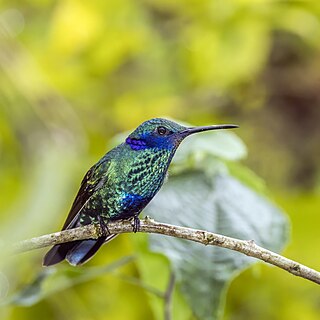
The sparkling violetear is a species of hummingbird widespread in highlands of northern and western South America, including a large part of the Andes, the Venezuelan Coastal Range, and the Tepuis. It occurs in a wide range of semi-open habitats, even in gardens and parks within major cities such as Quito, and is often the most common species of hummingbird in its range. It is highly vocal and territorial.

Los Nevados National Natural Park is a national park located in the Cordillera Central of the Colombian Andes. The park surrounds the northern volcanic complex formed by Nevado del Ruiz, Nevado del Tolima, Nevado de Santa Isabel, the paramillos of Cisne, Santa Rosa and Quindío and the Cerro Bravo and Cerro Machín.
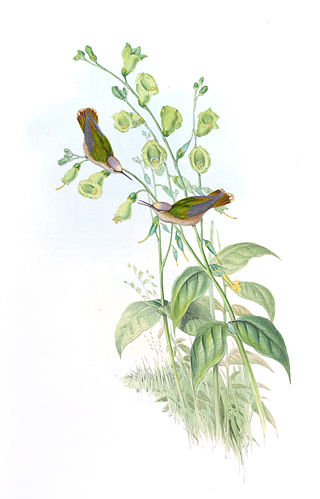
The Santa Marta blossomcrown is a Vulnerable species of hummingbird in the "emeralds", tribe Trochilini of subfamily Trochilinae. It endemic to the Sierra Nevada de Santa Marta of Colombia.

The lazuline sabrewing is a species of hummingbird in the "emeralds", tribe Trochilini of subfamily Trochilinae. It is found in Colombia, Ecuador, and Venezuela.
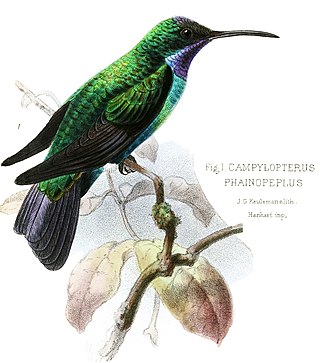
The Santa Marta sabrewing is a Critically Endangered species of hummingbird in the "emeralds", tribe Trochilini of subfamily Trochilinae. It is endemic to the Sierra Nevada de Santa Marta of northeastern Colombia. It is one of 24 bird species that are endemic to the Santa Marta highlands.

The Santa Marta woodstar is a species of hummingbird in tribe Mellisugini of subfamily Trochilinae, the "bee hummingbirds". It is endemic to Colombia.

The rainbow-bearded thornbill is a species of hummingbird in the "coquettes", tribe Lesbiini of subfamily Lesbiinae. It is found in Colombia, Ecuador, and Peru.

The coppery emerald is a species of hummingbird in the "emeralds", tribe Trochilini of subfamily Trochilinae. It is found in Colombia and Venezuela.

The dusky starfrontlet, also known as glittering starfrontlet, is an Endangered species of hummingbird in the "brilliants", tribe Heliantheini in subfamily Lesbiinae. It is endemic to a few small areas in western Colombia.
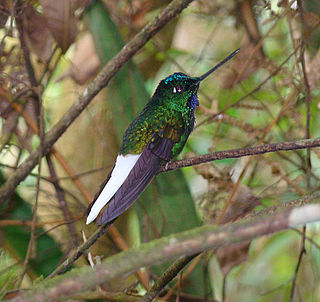
The white-tailed starfrontlet is a species of hummingbird in the "brilliants", tribe Heliantheini in subfamily Lesbiinae. It is endemic to the Sierra Nevada de Santa Marta of northeastern Colombia.
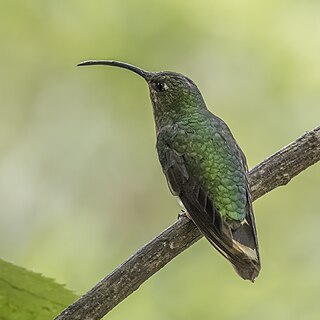
The mountain velvetbreast is a species of hummingbird in the "brilliants", tribe Heliantheini in subfamily Lesbiinae. It is found in Colombia, Ecuador, Peru, and Venezuela.

The bearded mountaineer or eastern mountaineer is a species of hummingbird in the "coquettes", tribe Lesbiini of subfamily Lesbiinae. It is endemic to Peru.
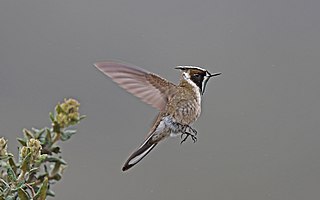
The bearded helmetcrests (Oxypogon) are a genus of hummingbird in the family Trochilidae. They are found in Colombia and Venezuela. Primary natural habitat is subtropical or tropical high-altitude grassland, known as páramo. The genus contains four species.

The black-backed thornbill is an Endangered species of hummingbird in the "coquettes", tribe Lesbiini of subfamily Lesbiinae. It is endemic to the Sierra Nevada de Santa Marta of northern Colombia.

The band-tailed guan is a species of bird in the family Cracidae, the chachalacas, guans, and curassows. It is found in Colombia and Venezuela.

The Santa Marta wren is a species of bird in the family Troglodytidae. It is endemic to Colombia.
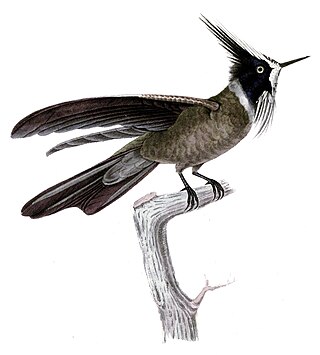
The white-bearded helmetcrest is a species of hummingbird in the "coquettes", tribe Lesbiini of subfamily Lesbiinae. It is endemic to northwestern Venezuela.

The green-bearded helmetcrest is a species of hummingbird in the "coquettes", tribe Lesbiini of subfamily Lesbiinae. It is endemic to Colombia.
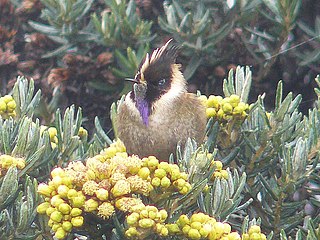
The buffy helmetcrest is a Vulnerable species of hummingbird in the "coquettes", tribe Lesbiini of subfamily Lesbiinae. It is endemic to Colombia.

The white-throated toucanet or greyish-throated toucanet is a near-passerine bird in the toucan family Ramphastidae. It is found in Colombia, Ecuador, and Venezuela.
























